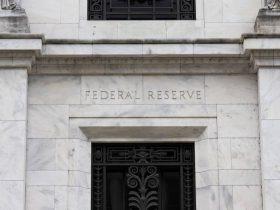Existing-home sales in August buckled under pressure from higher mortgage rates. New home sales, a bright spot in an overall dreary housing market, might not be immune.
With data expected this week on August’s new home sales, investors will get a read on whether rising mortgage rates will continue to slam home builder stocks as they did recently.
Existing-home sales in August dropped for the third straight month to a seasonally-adjusted annual rate only 1% higher than its recent 12-year low, set in January. Mortgage rates are the likely culprit: the average 30-year fixed mortgage rate rose above 7% in mid-August before ascending to its highest level in more than 20 years.
Sales activity looks unlikely to have rallied in September: Mortgage rates measured by
Freddie Mac
have remained above 7% so far this month, at a recent 7.19%. One leading indicator of future sales, the volume of applications for home purchase loans, has remained well below year-ago levels this month, according to Mortgage Bankers Association data. “As homebuyers continue to face higher rates and limited for-sale inventory, which have made purchase conditions more challenging,” Joel Kan, the trade group’s deputy chief economist, said in a statement last week.
Should the bond market reaction to expectations of fewer rate cuts in 2024 hold, this week’s Freddie Mac survey will likely move higher: the 10-year Treasury yield, with which mortgage rates often move, reached its highest level since 2007 on Thursday. Rocket Mortgage, a large mortgage originator, was quoting rates at 7.63% on Friday morning.
Mortgage rates could reach 8% in the short-term, National Association of Realtors chief economist Lawrence Yun said last week. That could put further pressure on existing-home sales, driving them to a new cyclical low, he said.
Shares of home builders, who had been the beneficiaries of the unusual housing market dynamic created by higher rates, have fallen recently as mortgage rates have risen. Earlier this year, builders stepped in to fill the void created by homeowners who have stayed put thanks to their ultralow mortgage rates. New home sales, as a result, soared: the metric rose as much as 32% above year-ago levels in July to its highest seasonally-adjusted annual rate since February 2022.
But mortgage rates’ recent rise has shaken confidence that the trend can continue: builder sentiment measured by the National Association of Home Builders turned negative earlier this month, while single-family housing starts in August slumped about 4% from the month prior.
Economists expect sales of new homes to have fallen in August, too: consensus estimates compiled by
FactSet
expect the government’s measure of contract signings to buy a new home to drop 2% from July, to a seasonally-adjusted annual rate of 700,000. The data is expected Tuesday at 10 a.m.
Economists at
Fannie Mae,
the government-sponsored enterprise that buys mortgages from loan originators in the secondary market, expect sales of new homes to slow in the fourth quarter, and in the first half of 2024. The winter months are typically cooler seasonally, but the higher cost of buying a home—a combination of higher mortgage rates and prices—will add further pressure.
Fannie Mae expects a mild recession next year, says Doug Duncan, Fannie Mae’s chief economist, which would also weigh on sales. The economists expect the average mortgage rate to end 2023 at 7.1%, and fall to 6.3% by the end of 2024 as job losses rise and the economy softens.
But all hope is not lost for home builder stocks. “As the easy money has been made, a close inspection of homebuilding points to a fairly decent backdrop for the industry, supported by favorable credit spreads, elevated demand, and low inventory,” Cirrus Research strategist Georgiana Fung and Director of Research Satya Pradhuman wrote in a Sept. 21 note titled “Homebuilders—Buy the Dip!”
”Although mortgage rates have risen rapidly in response to the aggressive Fed rate hikes, the current pause and even the expectation of a reversal in policy should shine a ray of light on the housing market,” they wrote, highlighting
PulteGroup
(ticker: PHM) and
Meritage Homes
(MTH) as small- and mid-cap ideas. The companies’ shares were down 3.1% and 4.8% last week, respectively, but up about 62% and 33% so far this year.
Write to Shaina Mishkin at [email protected]
Read the full article here













Leave a Reply